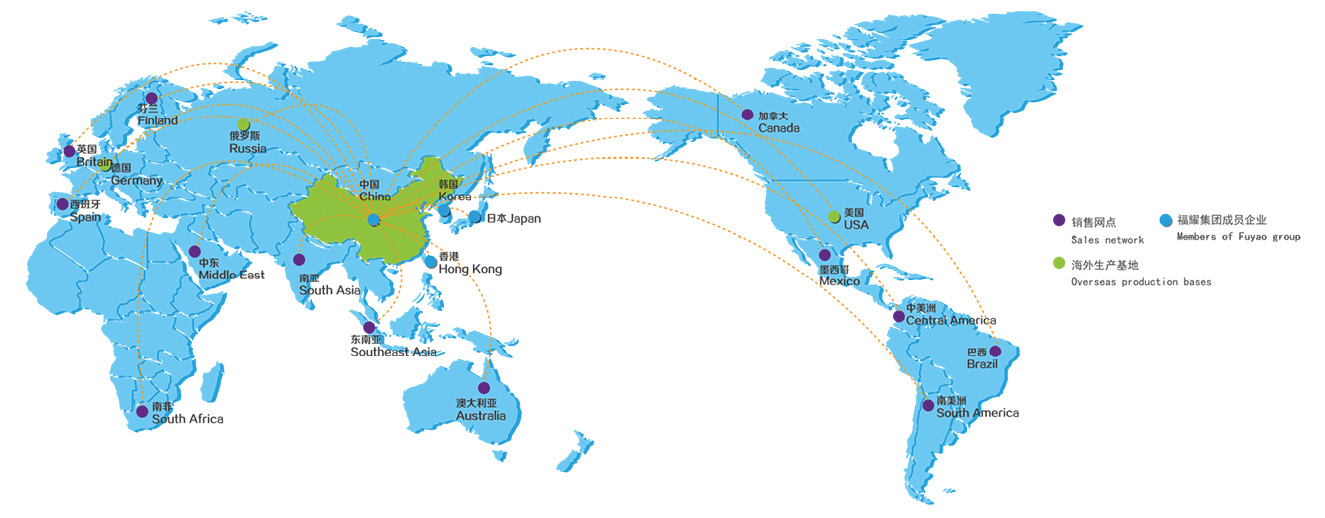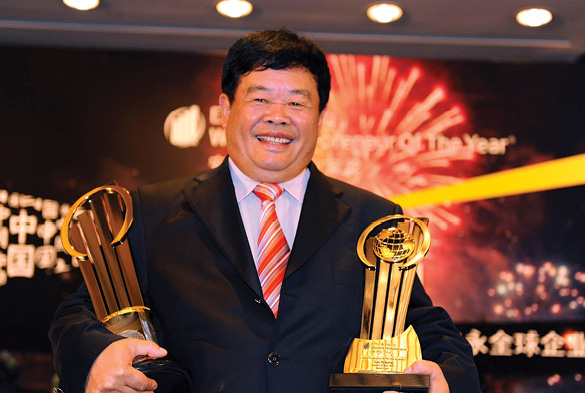- Home
- Media Kit
- Current Issue
- Past Issues
- Ad Specs-Submission
- Ad Print Settings
- Reprints (PDF)
- Photo Specifications (PDF)
- Contact Us

![]()
ONLINE

The World’s Largest Automotive Glass Supplier
Editors’ Note
In 1987, Cao Dewang founded Fuyao Glass and made it in 25 years one of the largest automotive glass manufacturers in the world. In 2009, Cao was awarded Ernst & Young’s World Entrepreneur of the Year , which is the world’s most prestigious business award for entrepreneurs, for his business acumen and philanthropic leadership in China. Cao is not only a well-known Chinese entrepreneur but a renowned philanthropist in China. He was recognized as the most generous philanthropist in China in both 2011 and 2012, with charitable donations of 4.58 billion RMB, and 3.64 billion RMB, respectively.
Company Brief
Fuyao Glass Industry Group Co., Ltd. (fuyaona.com), founded in 1987, is a leading international manufacturer of automotive and industrial glass located in the People’s Republic of China. The company has been listed on the Shanghai Stock Exchange since 1993. Today, it employs more than 20,000 people globally. Fuyao is the largest automotive glass supplier in China, supplying about 70 percent share of Chinese Original Equipment Manufacturing (OEM) market for glass. Fuyao is also the second largest glass supplier in the world market, serving OEM customers like GM, Ford, Chrysler, Volkswagen, Audi, Daimler, BMW, Honda, Toyota, Nissan, Hyundai, Kia, and many others in Asia, North and South America, Europe, Australia, and Africa. The company has been growing steadily and rapidly since its inception under the leadership of its founder and chairman, Cao Dewang.
Fuyao Group has transformed from a Chinese domestic glass supplier into a key global auto glass supplier in less than a decade. Today, Fuyao continues its transformation as it establishes subsidiaries in businesses such as office buildings, warehouses, and glass manufacturing plants in the U.S., Japan, South Korea, Russia, Germany, Australia, and Brazil.
Fuyao glass has been integrated into many great American cars, such as the Jeep Grand Cherokee, Jeep Patriot, Jeep Compass, Chevy Cruze, Chevy Malibu, Cadillac, Buick Regal, and Buick Verano. It also provides glass to the cars made by foreign manufactures in the U.S. such as the Hyundai Sonata, Elantra, and Kia Optima. Many OEM awards, including four GM “Supplier of the Year” awards, two Chrysler “Quality Awards,” and a Ford “Global Excellence Award,” are evidence of Fuyao’s outstanding performance and service to its OEM customers in the U.S.

Fuyao Group’s global landscape
As early as 2003, Fuyao Group set up its very first U.S. business office in Greenville, South Carolina, to provide aftermarket glass to the customers in North America.
Given the strong business demands from North American OEMs, FANA was established in June 2008 in the state of Michigan to supply auto glass directly to OEM assembly plants in North America. Fuyao Group has directed millions of dollars of investment into the U.S. through FANA. Today, FANA has the most advanced value-added operations and research and development center in the Fuyao Group.
On March 17, 2014, FGA was established as a wholly owned subsidiary of Fuyao Group. This company is located in Moraine, Ohio, near Interstate 75, the industrial corridor of the U.S. that runs north to south through the heartland of the country. On May 15, 2014, FGA purchased 450,000 square meters of the former General Motors Truck Assembly facility and renovated the 140,000-square-meter building to meet its production needs. The initial phase had the capacity for one million car sets. By the end of 2016, it will have built the capacity for four million car sets to service the OEM market. An additional $130-million investment is being put into in ramping up value, adding operations, and building the capacity for four-million pieces of windshield glass for the ARG market, which will be completed by the end of 2015. This plant will have the most advanced equipment and automated production lines, and will be the new role model for the U.S. automotive glass industry.
Furthermore, to strengthen its supply chain, Fuyao purchased the assets of the former PPG’s float glass plant in Illinois in July 2014. The plant underwent major repairs and has the capacity to produce 500 tons of high quality float glass daily for Fuyao’s automotive mission.
Due to the recovery of the U.S. auto market and Fuyao’s recent successes in that market, as well as the issues such as insufficient production capacity and outdated equipment that its competitors are facing, Fuyao projects have been well received by its automotive customers, which include General Motors, Chrysler, Honda, Hyundai, Volkswagen, BMW, Ford, and other major automotive manufacturers.
In the very near future, Fuyao’s automotive glass manufacturing base will employ close to 2,000 in its U.S. workforce and will have state-of-the-art technology, tooling, and processes. Fuyao’s total investment in the U.S. for its expansion projects is estimated to be more than $600 million over the next five years. Fuyao is certain that these projects will inject economic vitality into the surrounding communities and have profound impact on the local economies. Furthermore, it hopes the success of the Fuyao project will strengthen business relationships between China and the U.S. and improve the mutual understandings between the people of the two countries.

Cao Dewang Named Ernst & Young
World Entrepreneur Of The Year 2009
What is the history of Fuyao Glass and how has the company evolved?
I established Fuyao in 1987, after I had served as the director of a township enterprise that mainly focused on making water meter glass. I stepped into the automotive glass sector in 1985 with that enterprise. I realize then it could be a promising industry and founded Fuyao based on that vision. At that time, Fuyao was really small, with only a million-level registered capital. After nearly three decades, Fuyao has become the world’s largest automotive glass supplier.
We started investing in the U.S. market in 1995, and we have existing facilities in Alabama, Michigan, and South Carolina. We have two new plants being developed, one in Ohio and the other in Mount Zion, Illinois; the two projects together will require a $600-million investment. Fuyao went public in 1991 and was listed on the A-share market in 1993. On March 31, 2015, we debuted at the H-share listing in Hong Kong, held mainly by the world’s 100 largest funds.
You won Ernst and Young’s 2009 World Entrepreneur of the Year Award. Did you always know you had the entrepreneurial spirit and how important is it for you to keep that kind of culture at Fuyao Glass?
There’s a clear line between entrepreneurs and businessmen. Entrepreneurs must start their own businesses completely from scratch, then manage them with integrity and obtain good market performances. Whether one is defined as a global or domestic entrepreneur depends on the scale of the impact of one’s product as well as individual preference. Moreover, it also falls on the entrepreneur to maintain routine operations, social recognition, HR management, etc. He/she must have the “five virtues” proposed by our ancient saints: humanity, righteousness, propriety, wisdom, and credibility.
Before entering the auto glass sector, I recognized that no one was actually making automotive glass in China, which left auto repair companies with no choice but to import the commodity, and that led to overpriced services and a high cost of car ownership. After some basic market research, it appeared that big companies were not willing to do this small-scale business but small companies were not capable of doing it. I then established the goal of making affordable glass for the Chinese. The virtue of that goal later became an essential component of our new employees’ training session regarding corporate values.
Although this industry is hardly as profitable as some other sectors like real estate, we insist on doing it since we make a good enough profit and benefit our people. To some extent, when entering the international market, a piece of glass represents our country’s economic progress and an outcome of our reform. In that sense, I’m especially proud to say that we’ve expanded into 15 provinces in China and occupy over 70 percent domestic market share. We’ve also opened up subsidiaries in nine different countries worldwide and grown into the world’s largest auto glass provider.
You were named China’s most generous philanthropist four times by China’s Hurun Report. What makes philanthropy so important for you and what are the key causes of your support?
Gratitude is something I have held in mind all of these years. I was born in 1946 and it’s hard to imagine how difficult my childhood was. I made it through those tough years, and I wouldn’t have become who I am today without the reform and opening-up policy initiated by Deng Xiaoping. Deng encouraged some people to get rich first, but the counterbalancing equality and enforcement measures were not in place to mitigate the income gap. It was quite obvious that the poorer group would become discontented with the richer group, as well the policy makers. As one of the early successful entrepreneurs, I believe we should remain grateful and strive to help the vulnerable as long as it doesn’t undermine our own quality of life or business operations. If we can reach such consensus, our society will develop more harmoniously.
What are your thoughts on current economic conditions in China?
I’m very concerned, because China is currently in a transitional phase, like Russia, Brazil, and India. It’s similar to the process of evolution; volatility and fluctuation are inevitable for fragile, newly born economies. We can also compare the process to the experience of being a father for the first time: no matter how much one wants to bear his child’s pain along the way, there is nothing he can do but watch the child learn to walk on his/her own. Human civilization developed from primitive to agricultural and then to the industrial stage, and the evolutionary process of a country appears to be exactly the same. Though difficult and painful, it is something we cannot be exempted from. Economic activities have their own rules and cycles.
Fuyao is without doubt one of the most important members of CGCC, so how can Chinese companies in the States be better served and what are your expectations of CGCC moving forward?
There are three layers of the Chamber of Commerce’s main functionality: to organize members and protect their rights and interests; to collect their information and learn about their pressing needs; and to facilitate them to resolve any problems through necessary coordination efforts or logistical support.
In most cases, challenging situations are experienced by relatively small enterprises; at that point, members on the Board of (Executive) Directors (i.e. large-scale corporations) should have a spirit of dedication that motivates them to help others in every possible way. Meanwhile, the Chamber should also assist members to its fullest capability in accumulating more trust and recognition from other member companies.
I believe that one of the founding values of CGCC is to represent our country’s interests and protect Chinese enterprises in the United States. In that regard, if we can learn from other countries’ counterparts and benefit from their practices, CGCC will definitely make more progress in the future.•